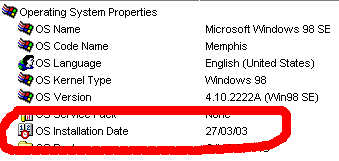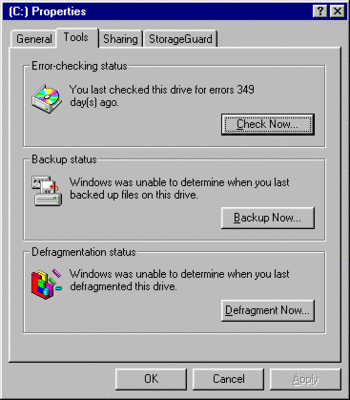Got a problem? Defrag. Computer running slow? Defrag. Computer crashing? Defrag. Cursor the wrong colour? Defrag.
What is people’s obsession with defragging their hard disks? It seems to be the fallback solution of most “experts” that you should defrag your hard disk whenever something is wrong.
I was around in the early days of DOS and, yes, we defragged. I can remember sitting for two hours waiting for an 80Mb drive (one of the largest at the time) to defrag (actually, I probably used either DiskOpt or ORG back in those DOS days, but it's the same principle). I still don’t know why. That’s a lie… I know why defragmenting (to give it it’s proper name) is supposed to work. Technically, when your hard disk is near full, a new file created will not fit at the end so instead the computer cuts it up and shoves it into any gaps it can find anywhere on the hard disk. The space it uses to put the file in is the space where old, deleted files once resided.
Over time, if you’re running your disk at near-capacity and you delete lots of file to clean up space for newer ones, the files on your hard disk will fragment (i.e. they will get broken up and jumbled about). Your computer always knows where all the bits of them are, so it’s not a danger, but it can lead to slight delays in retrieving those files later.
Defragmenting is the process of going through the hard disk, sellotaping all those files back together and putting them in a nice order so that they are all in one piece again. Great. Sounds useful. Unfortunately, it takes several HOURS to defrag a hard disk and sometimes it can take literally all night. Let’s say that again: a modern, top-of-the-range computer will take several HOURS to defrag a single drive.
People used to worry about wasted computer time back when it cost lots of money per MHz but apparently now that we’re in GHz, it’s only fair to leave the computer running all day to perform a single, fairly unnecessary task. Fair enough, defragmenting is seen as a maintenance exercise, much like performing anti-viral scans or using Scandisk (which, I would like to add, are actually much more useful and worthwhile).
The trouble stems from the fact that even when my anti-virus scan is chugging away in the background, I can still use my computer. I can play my games or browse the internet. Try running defrag and organising your files at the same time. Sometimes even a click of the mouse can make defrag restart itself. The recommended route is to boot to a clean version of Windows, kill all tasks and run Defrag and leave the computer. I’m sorry… what a waste of electricity, time and effort.
I don’t doubt that defragging my disk will make my file accesses go a little faster. I don’t have a problem with that at all, I know the theory, I just can’t see the practice. However, the increase is file access speed is so small we must be talking in the range of fractions of a second. Yes, they probably do all add up but not to the hours that I waste waiting for it to defrag.
I only run “old” computers. I’ve never had the latest twenty-billion GHz machine and I don’t want one, either. My computers are always JUST behind the top-of-the-line, in the comfortable zone. Currently, I’m using a 1.2GHz machine. It does EVERYTHING that I need it to. Theoretically, I should notice a larger difference after I’ve defragged a disk that someone with a top-of-the-line SATA super-fast harddrive. My computer runs fine, it’s comfortable, it hasn’t slowed down over the years I’ve had it (mainly due to good maintenance of the software I put on it) and my hard drive doesn’t fly all over the disk to pick up it’s data.
I work as an ICT Technician for some schools in my local area. The teachers often come to me for advice on their computers and I’m amazed how often many of them have been told to, or assume that they should, defrag their hard drives. They do it for everything from a virus infection to a BSOD. Guess what, it never works. It barely works for the purpose for which it’s intended. They seem shocked to learn that the last time I defragged was three years before I took my GCSE's (i.e. age 12 for you Americans).
My hard drive is behind the times but my computer runs fine, no matter how many times my disk has been filled and deleted (believe me, it’s several… about twice a year I have to seriously consider my storage on the computer, compressing, archiving, moving, deleting or, in extreme cases, upgrading). God knows what it looks like from a technical standpoint, but my Windows runs just fine, thank you very much. No chugging. No problems.
Defragging may well have a purpose for, e.g. file-storage servers. But then, excuse me, why the hell are they running a rubbish windows FAT filesystem that’s prone to all sorts of problems? All filesystems suffer from fragmentation to a certain extent but FAT’s gotta be one of the worse for it. The average home user cannot possibly benefit enough from a defrag to make it worth their while. Most people I know don’t even get close to filling a fraction of their harddrive in all the time they have a computer.
What do I tell these saddened people who come to me with their tales of computer woe, of games that won't load or of computers that take 10 minutes to boot? They invariably tell me that they were told to defrag and did so. My reply...
What a waste of time.
 |  |
No comments:
Post a Comment